'Two Skins': Hard Lessons For Law Students at Immigration Detention Center
"I still wake up at night thinking about many of these people. Not the cases, but the people that we met," said Florencia Cornu, law student at St. Thomas University School of Law in Miami Gardens.
August 27, 2018 at 01:41 PM
8 minute read
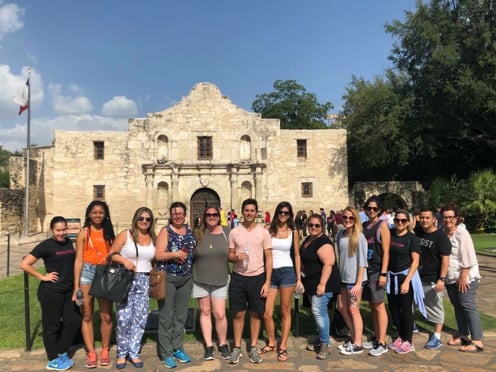 St Thomas University School of Law students, professors and mental health experts in Texas. Photo: Alexsandra Simoes/St Thomas University
St Thomas University School of Law students, professors and mental health experts in Texas. Photo: Alexsandra Simoes/St Thomas University
Students from St. Thomas University School of Law in Miami Gardens who spent a week at the Karnes Detention Center in Texas say the experience taught them something law books don't usually spell out.
The group of 12 provided legal help to more than 50 different fathers and sons who'd been separated at the U.S. border. They worked in partnership with Refugee and Immigrant Center for Education and Legal Services, a nonprofit organization inside the detention center that provides free or low-cost legal aid to immigrants.
The St. Thomas Law Karnes Pro Bono Project was the third of its kind, but “this time was different,” according to Lauren Gilbert, professor of law and director of the Immigration Practice Certificate Program at St Thomas.
“I think some of (the students) are really experiencing vicarious trauma from what they saw and experienced,” said Gilbert, who led the trip with social science professor and trauma specialist Judith Bachay.
One student, Florencia Cornu, recalled seeing grown men crying, frustrated with immigration paperwork they didn't understand.
“I still wake up at night thinking about many of these people. Not the cases, but the people that we met,” Cornu said.
As a juris doctor candidate, Cornu said she'd thought she was prepared beforehand.
“Although I knew it's not the same to follow a case in a book, this was people's pain, stories of poverty, of fear of persecution, fathers trying to get a better opportunity for their kids,” she said. “It was very touching.”
Related story: Migrant Mother Files Suit in Miami Alleging Abuse at Detention Center That Held Her Son
The students arrived July 28, two days after a federal judge's deadline for the reunification of parents and children.
Karnes had moved its female detainees to another center in Dilley, Texas, weeks earlier, which resulted in a “huge influx of fathers and sons who were reunified that week,” according to Gilbert.
“In some cases, we were seeing them just at the point that they were getting to know each other again. It was hard because there was really no time for them to heal or reconnect, and they were having to make these dramatic decisions about what they were going to do,” Gilbert said.
While younger kids held onto their fathers “for dear life,” many of the the older ones, Gilbert said, were angry with them.
“They sort of felt like, 'This is not what I expected when I made this journey,'” he said.
Related story: Florida Attorneys Lend Support to Separated Immigrant Families
Cornu implored fellow South Florida law students and lawyers to make the trip.
“It really puts life in perspective,” she said. “Maybe (the clients) were or they weren't under the scope of the statute or the asylum rules, but all of them were fleeing suffering, fleeing fear and trying to protect their own. What shocked me was most of them were working people, exactly like us, and they were treated as criminals.”
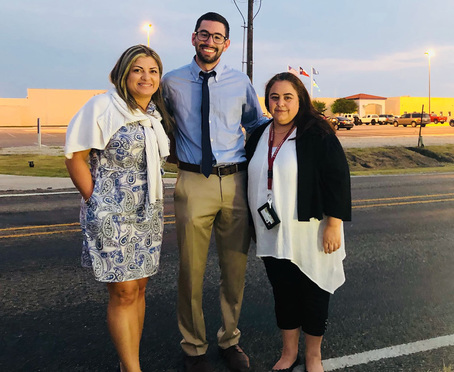 St. Thomas students Alexsandra Simoes, left, Ryan Clough, center, and Florencia Cornu, right. Photo: Professor Lauren Gilbert/ St. Thomas University
St. Thomas students Alexsandra Simoes, left, Ryan Clough, center, and Florencia Cornu, right. Photo: Professor Lauren Gilbert/ St. Thomas UniversityThe project was led by Immigration Law Students Association at St. Thomas University, its president, Andrea Valencia, and immediate past president, Diego Sanchez.
“Of course, in school we learn the law,” said Alexsandra Simoes, St. Thomas law student and member of ILSA. ”But law doesn't teach you how to be compassionate. In order for us to do justice, we need to have an open mind and an open heart. It can't be just about the Black Letter Law.”
In concert with the Refugee and Immigrant Center for Education and Legal Services, the students listened to the clients' stories, helped them understand their legal options and prepare for interviews with immigration officials.
“It wasn't an assembly line,” said law student Donna Nasimov, who also compiled a blog about the trip. “It was trying to figure out what the best option was for everybody.”
 Child immigrants. Photo: Ross D. Franklin/AP Photo.
Child immigrants. Photo: Ross D. Franklin/AP Photo.Click here to read the KTU Karnes Project blog
According to Nasimov, practicing immigration law requires “two skins.”
“You have to have the compassionate, understanding personality, but I think you also have to have a tough skin because you are not only retraumatizing these people by having them tell their story, but you are being traumatized in the process because you're living these stories 50 times in a week,” she said.
For Nasimov, seeing immigration statutes play out in real time was a lot to stomach.
“If you have a passion for it, then it's very rewarding. But you also can't be too much of a bleeding heart because you have to think logically and legally,” she said. “Even though their stories are very heartbreaking, they might not all have a legal basis to stay in this country and claim asylum.”
Crossing the U.S. border without official clearance is, after all, illegal.
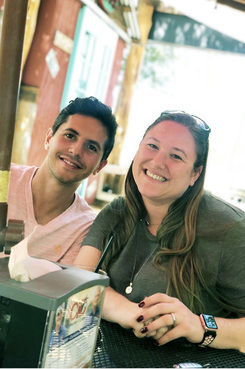 St. Thomas students Lucas Aisenberg and Donna Nasimov. Photo: Professor Lauren Gilbert/St. Thomas Univeristy.
St. Thomas students Lucas Aisenberg and Donna Nasimov. Photo: Professor Lauren Gilbert/St. Thomas Univeristy.Nasimov said many of her clients were confused about their rights.
“A lot of these fathers were coerced or told, 'If you sign this paperwork then you can see your son again.' But it turns out they were signing deportation orders, or they were voluntarily waiving any rights to their children,” Nasimov said.
Fellow law student, Cornu, claimed some clients experienced poor conditions at Karnes and other centers.
“I was talking to people who were eating the same food for days and days in other detention centers, who were being given cold soup for their meals for 20, 30 days, and were in despair because they didn't know where their kids were. At the end of the day, they will sign anything to end this,” Cornu said.
A spokesperson from U.S. Immigration and Customs Enforcement called allegations like these “unfair,” and suggested they weren't backed up by “hard facts.”
ICE requested the names, dates of birth and alien registration numbers of the clients so that it could cross-check the information and verify whether complaints were filed. But this was not possible because clients of the Refugee and Immigrant Center for Education and Legal Services had signed a nondisclosure agreement.
As for the alleged “cold soup,” ICE public affairs officer Adelina “Nina” Pruneda stated it would be “one-sided” to “simply take the word of these students,” but did not comment further.
'Credible fear'
Student Simoes also recalled working with an indigenous Guatamalan man at Karnes who claimed he'd been persecuted in his home village, where his tribal ethnicity was considered a minority.
Simoes helped him prepare for an upcoming “credible fear interview,” conducted by asylum officers to gauge the legal validity of asylum claims.
“During the interview before the judge, he was so worried about his child, on top of not having an interpreter that spoke his indigenous language,” she said. “His mind was not there, he was just worried about the whereabouts of his child.”
According to Simoes, the barriers to justice in detention centers are considerable.
“I think laws have to be followed, and I'm not saying open the borders and let everybody in. Not at all. But their main treasure is not there with them, which is their child. We can't treat people like this,” she said.
Cornu also remembered the Guatemalan man, who failed his interview.
“He had a good argument for asylum,” she said.
According to their professor, Gilbert, that man's story was far from unusual.
“We saw a lot of those cases where they failed because they just weren't able to focus on what the asylum officer was asking them,” Gilbert said.
But worse than that, Nasimov said, was watching client after client blame themselves for being separated from their children.
“After everything that they went through, these fathers were asking their children for forgiveness,” she said. “Not for bringing them over here or getting mad at them, but to ask a seven-year-old to forgive them for putting those kids in that situation.”
This content has been archived. It is available through our partners, LexisNexis® and Bloomberg Law.
To view this content, please continue to their sites.
Not a Lexis Subscriber?
Subscribe Now
Not a Bloomberg Law Subscriber?
Subscribe Now
NOT FOR REPRINT
© 2025 ALM Global, LLC, All Rights Reserved. Request academic re-use from www.copyright.com. All other uses, submit a request to [email protected]. For more information visit Asset & Logo Licensing.
You Might Like
View All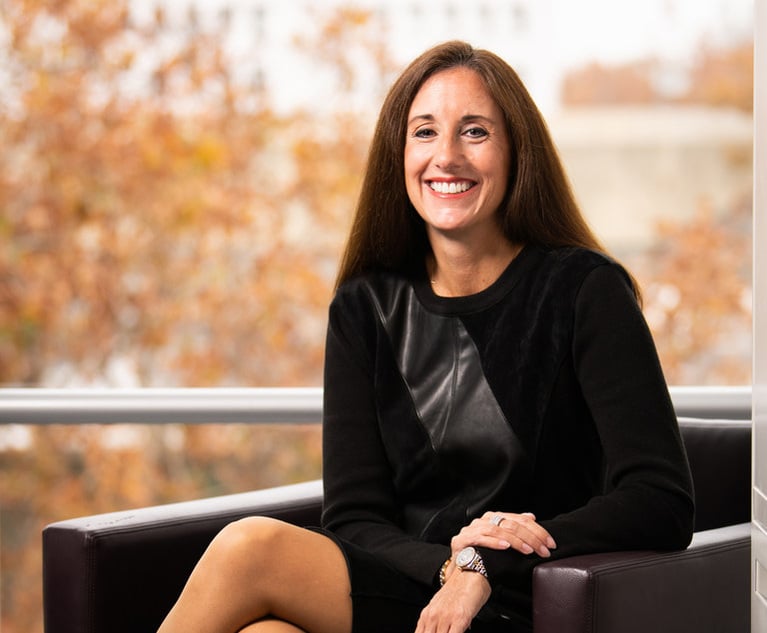
EB-5 Rebounds After a Rocky Year: Challenges of 2024 Lay Groundwork for a Booming 2025

'Close Our Borders?' Senate Judiciary Committee Examines Economics, Legal Predicate for Mass Deportation Proposal
3 minute read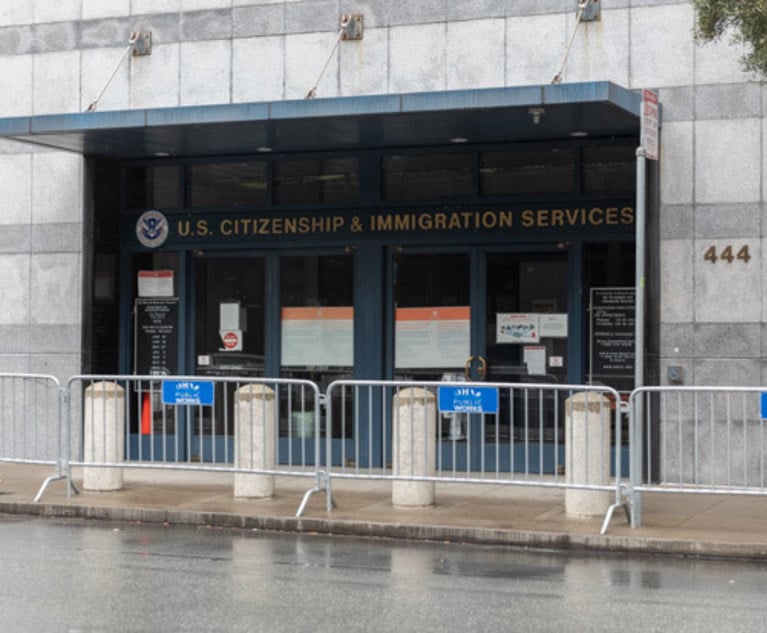
Anticipating a New Era of 'Extreme Vetting,' Big Law Immigration Attys Prep for Demand Surge
6 minute read
The Canadian Influx: How Migration to Florida Is Shaping the South Florida Real Estate Market
6 minute readTrending Stories
- 1Plaintiff Argues Jury's $22M Punitive Damages Finding Undermines J&J's Talc Trial Win
- 2Bannon's Fraud Trial Delayed One Week as New, 'More Aggressive,' Defense Attorneys Get Ready
- 3'AI-Generated' Case References? This African Law Firm Is Under Investigation
- 4John Deere Annual Meeting Offers Peek Into DEI Strife That Looms for Companies Nationwide
- 5Why Associates in This Growing Legal Market Are Leaving Their Firms
Who Got The Work
J. Brugh Lower of Gibbons has entered an appearance for industrial equipment supplier Devco Corporation in a pending trademark infringement lawsuit. The suit, accusing the defendant of selling knock-off Graco products, was filed Dec. 18 in New Jersey District Court by Rivkin Radler on behalf of Graco Inc. and Graco Minnesota. The case, assigned to U.S. District Judge Zahid N. Quraishi, is 3:24-cv-11294, Graco Inc. et al v. Devco Corporation.
Who Got The Work
Rebecca Maller-Stein and Kent A. Yalowitz of Arnold & Porter Kaye Scholer have entered their appearances for Hanaco Venture Capital and its executives, Lior Prosor and David Frankel, in a pending securities lawsuit. The action, filed on Dec. 24 in New York Southern District Court by Zell, Aron & Co. on behalf of Goldeneye Advisors, accuses the defendants of negligently and fraudulently managing the plaintiff's $1 million investment. The case, assigned to U.S. District Judge Vernon S. Broderick, is 1:24-cv-09918, Goldeneye Advisors, LLC v. Hanaco Venture Capital, Ltd. et al.
Who Got The Work
Attorneys from A&O Shearman has stepped in as defense counsel for Toronto-Dominion Bank and other defendants in a pending securities class action. The suit, filed Dec. 11 in New York Southern District Court by Bleichmar Fonti & Auld, accuses the defendants of concealing the bank's 'pervasive' deficiencies in regards to its compliance with the Bank Secrecy Act and the quality of its anti-money laundering controls. The case, assigned to U.S. District Judge Arun Subramanian, is 1:24-cv-09445, Gonzalez v. The Toronto-Dominion Bank et al.
Who Got The Work
Crown Castle International, a Pennsylvania company providing shared communications infrastructure, has turned to Luke D. Wolf of Gordon Rees Scully Mansukhani to fend off a pending breach-of-contract lawsuit. The court action, filed Nov. 25 in Michigan Eastern District Court by Hooper Hathaway PC on behalf of The Town Residences LLC, accuses Crown Castle of failing to transfer approximately $30,000 in utility payments from T-Mobile in breach of a roof-top lease and assignment agreement. The case, assigned to U.S. District Judge Susan K. Declercq, is 2:24-cv-13131, The Town Residences LLC v. T-Mobile US, Inc. et al.
Who Got The Work
Wilfred P. Coronato and Daniel M. Schwartz of McCarter & English have stepped in as defense counsel to Electrolux Home Products Inc. in a pending product liability lawsuit. The court action, filed Nov. 26 in New York Eastern District Court by Poulos Lopiccolo PC and Nagel Rice LLP on behalf of David Stern, alleges that the defendant's refrigerators’ drawers and shelving repeatedly break and fall apart within months after purchase. The case, assigned to U.S. District Judge Joan M. Azrack, is 2:24-cv-08204, Stern v. Electrolux Home Products, Inc.
Featured Firms
Law Offices of Gary Martin Hays & Associates, P.C.
(470) 294-1674
Law Offices of Mark E. Salomone
(857) 444-6468
Smith & Hassler
(713) 739-1250






